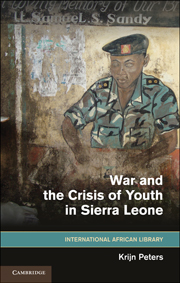Book contents
- Frontmatter
- Contents
- Acknowledgements
- Abbreviations
- Introduction
- 1 Voices from the Battlefield: Ex-Combatants' Views on Root Causes of the War and Their Reasons for Participation
- 2 The Socio-Economic Crisis of Rural Youth
- 3 Conflict in Sierra Leone and Recruits to the War
- 4 The World of the RUF
- 5 Malfunctions and Atrocities
- 6 Cultivating Peace: RUF Ex-Combatants' Involvement in Post-War Agricultural Projects
- 7 Footpaths to Reintegration? Agrarian Solutions for the Reintegration of Ex-Combatants
- 8 Conclusion: The RUF as a Rural Underclass Project
- Epilogue
- Annex I A Chronology
- Annex II Overview: Interviewed Ex-RUF Combatants
- References
- Index
- THE INTERNATIONAL AFRICAN LIBRARY
7 - Footpaths to Reintegration? Agrarian Solutions for the Reintegration of Ex-Combatants
Published online by Cambridge University Press: 03 May 2011
- Frontmatter
- Contents
- Acknowledgements
- Abbreviations
- Introduction
- 1 Voices from the Battlefield: Ex-Combatants' Views on Root Causes of the War and Their Reasons for Participation
- 2 The Socio-Economic Crisis of Rural Youth
- 3 Conflict in Sierra Leone and Recruits to the War
- 4 The World of the RUF
- 5 Malfunctions and Atrocities
- 6 Cultivating Peace: RUF Ex-Combatants' Involvement in Post-War Agricultural Projects
- 7 Footpaths to Reintegration? Agrarian Solutions for the Reintegration of Ex-Combatants
- 8 Conclusion: The RUF as a Rural Underclass Project
- Epilogue
- Annex I A Chronology
- Annex II Overview: Interviewed Ex-RUF Combatants
- References
- Index
- THE INTERNATIONAL AFRICAN LIBRARY
Summary
A Crisis Denied
It seems rather paradoxical that a rag-tag rebel army with a handful of semi-intellectuals had been aware of the socio-political and economic situation of young people from weak families in isolated and run-down rural areas – and subsequently formulated an ideology which attracted (or convinced) significant numbers of supporters – while, after all the country had been through, the post-war (SLPP) government of Sierra Leone seemingly remained unaware of the dire situation of its rural youth. Conversely, the lack of measures by the government to address a major cause of the outbreak of the conflict can suggest only that Freetown was indeed unaware – or in denial – of the problem.
A central policy of the government, straight after the war, was to decentralise power by rebuilding and restrengthening the powers and authority of the paramount chiefs (chieftaincy elections in December 2002 were a part of this). How and to what extent this will guarantee a more democratic and inclusive representation of all rural Sierra Leoneans is yet unclear. Before the war paramount chiefs were elected by a college of Traditional Authorities (TA), each representing 20 taxpayers. According to Richards et al. (2004a: 24), ‘It is a moot point whether tax records ever bore much relation to reality, and quite how these taxpayer representatives are selected or replaced seems rather vague. TAs are local elders, and represent, in effect, the interest of local land-owning lineages’.
- Type
- Chapter
- Information
- War and the Crisis of Youth in Sierra Leone , pp. 199 - 211Publisher: Cambridge University PressPrint publication year: 2011

